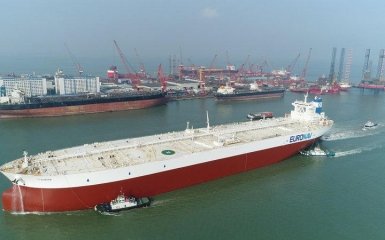Russia's creation of a shadow fleet to sell oil to circumvent the price limit imposed by the West prompted a large number of oil carriers to do the same.
What prompts oil carriers to bypass the introduced price limit for Russian oil
It is noted that Russia currently has many vessels that transport oil to India, China and Iran, bypassing the price ceiling set by the West.
At the same time, the journalists emphasise that the ships in the shadow fleet are primarily old and receive poor maintenance.
Three-quarters of such vessels do not have insurance and also travel with their transponders turned off, increasing the risk of accidents.
Most legitimate oil shipping companies are growing discontented as the activities of shadow fleet ships tarnish their reputations.
The authors of the article note that the key problem lies in the confusion, inconsistency and excessive bureaucracy of the mechanism for limiting the price of selling Russian oil.
In addition, documents for compliance with the price limit on the purchase of Russian oil are too easy to forge.
Predominantly, the requirement to comply with the price cap applies to countries close to the G7 member states.
It has led to many oil-carrying vessels opting to withdraw and operate in shadowy schemes, carrying Russian oil without restrictions, red tape, registration, or insurance requirements.
The publication notes that more than 800 tankers, at least 20% of their total number, are currently working under shadow schemes for the transportation of Russian oil.
Journalists emphasise that vessels are usually registered in countries such as Panama, Liberia and the Marshall Islands.
However, over the past six months, the number of landlocked vessels registered in Guinea-Bissau, Gabon and even Eswatini has increased dramatically.
There has also been a significant increase in insurance companies, most registered in India.
How can Western countries end the circumvention of price restrictions on Russian oil sales?
Given this situation, the authors of the material conclude that the price ceiling for Russian oil set by Western countries does not work.
At the same time, the material notes that correcting the situation will be extremely difficult and that it is unlikely to be possible to do so diplomatically.
The publication's authors emphasise that using the military fleet could have prevented some of the most egregious cases.
However, it will be very difficult to go beyond the established international legislation, which is based on the principle of freedom of navigation.
According to international maritime law, warships can board foreign-flagged ships on the high seas only under clearly defined circumstances, including those related to piracy, slave trade, and the like.
An appropriate resolution of the UN Security Council will probably be necessary to conduct inspections of vessels that transport Russian oil to bypass the price ceiling set by Western countries. Still, as permanent members, Russia and China will never allow this.
Given that countries such as Russia, China and Iran are using democratic principles against democracies themselves, there is a need to take strong retaliatory action without a UN Security Council resolution.



